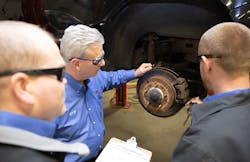SHOP STATS: VIP Tires & Service Locations: 58 locations in the New England area Average Monthly Car Count: 500 Total Staff Size: 500 Average Shop Size: Nearly 5-6,000 sq. ft.; Annual Revenue for Comapny;$70 Million
When November hits each year, it’s go time for VIP Tires & Service. For six weeks straight, the entire business model flips.
“In that six-week window, that tire business fluctuates as much as 400 percent,” Gary MacCausland, vice president of VIP Tires & Service, a 58-location New England-based, privately held service provider, says.
Since VIP Tires & Service is located in the Northeast, it’s common for the shops to get hit with snow, which increases the amount of hours employees need to stick around to help. In the past, tire stores will hire extra help, but often have to lay off said help once the slow season starts. According to MacCausland, the slow season generally kicks off in January.
After the corporate entity of VIP Tires & Service had a major shift in management after its auto parts business—which was comprised of 56 auto parts stores and one distribution center throughout Maine, New Hampshire and Massachusetts—was purchased by O’Reilly’s, the company decided to refocus its culture and pivot toward a more people-friendly focus.
The Backstory
MacCausland says it was an exciting time when the previous parts business of VIP Tires & Service was sold to O’Reilly’s; once the parts business left, so did the company’s entire management team.
“It was exciting because we opened up one morning with 56 locations and no managers,” MacCausland says.
With a career in tires that moved his family across the U.S. and spanned 30 years, welcoming change is a common practice for MacCausland. After the loss of management, MacCausland worked alongside president and CEO, Tim Winkeler, to redevelop the 60-year-old company’s culture.
“This is a blank slate,” MacCausland says. “That was when we really became people focused.”
The Problem
In order to accommodate the sudden change in work, it was common practice to hire seasonal help—much like retail stores do throughout the holiday seasons. MacCausland says employees were typically hired around October, trained leading up to the busy months, and then let go during the slow season. It was difficult to find great work, MacCausland says.
“It was a whole process,” MacCausland says. “It was kind of a culture [in tire business] and it was hard not to do it.”
In order to successfully overcome the shift, MacCausland says roughly two people were typically hired for each shop. However, hiring for a seasonal job comes with its challenges, such as adjusting payroll for a short amount of time, as well as working alongside those who might not be as passionate, McCausland says.
When hiring seasonal staff, it was common to run into issues, as most employees had a second job and did not share the same level of commitment that other staff members had. In addition, the stress behind layoffs during the slow season was not something the shop wanted to impose on employees, MacCausland says.
“They know they’re pending,” MacCausland says.
With a constant turnover cycle, the business' turnover rate topped around 60 percent for entry-level jobs, he says.
The Solution
When creating a new culture for VIP Tires, following the departure of the company’s managers, it was decided to leave behind seasonal practice and look for a better option. With a goal to retain employees, build their careers and further assist customers, both MacCausland and Winkeler implemented a different tactic: prepare for seasonal change by adjusting employees’ hours in the shop.
“We made the decision not to do that [seasonal employees],” MacCausland says.
The decision to adjust the previous method came as the company’s new culture became more in line with providing opportunity to employees and focusing on people, MacCausland says.
“We’re really big on career pathing our associates,” MacCausland says. “We’ve got a pretty detailed career path, and we want to hire people that are looking for career paths.”
When employees are hired, they know that the hours will fluctuate during the busy and slow seasons, MacCausland says.
“We have conversations every August,” MacCausland says. “John and I travel and we have meetings with the managers and we talk about a budget. We walk the managers through exercises [regarding] how many hours [they] are going to produce and they see how the shop works.”
“Part of our culture is having two store meetings per month with everybody and saying, ‘Hey, this is what’s going to happen,’” MacCausland adds.
During those meetings, employees are informed about the fluctuation of hours, as well as certain situations where everyone is to report to the shop.
At VIP Tires, employees now know that they will average around 48 hours, six days per week during the busy period of time, and then will cut back to 32-35 hours during the slow months. In addition, everyone on the staff is cross-trained as a way to have all hands on deck when it’s necessary.
“They’re going to get overtime, and their earnings are going to go through the roof,” MacCausland says. “It’s a win for the associate and they get a little extra money for Christmas.”
“It only happens maybe three times per year where we have an ‘all hands on deck’ during the first or second snow storm of the year,” he adds. “They’re paid on productivity and they get compensation.
“The guys get it. The folks that are here now get it and, again, they see the value of knowing they’re not going to get laid off [during the slow season]. Our culture is that we’ve got your back.”
The Aftermath
Since VIP Tires has gotten rid of having seasonal help during the shop fluctuation period, MacCausland says that the shop has seen an overall decrease in turnover within the company.
“We’re at the mid-30s now,” MacCausland says. “It’s something we measure, we report on it monthly, and we have it ranked by store and district manager.”
He says the company has worked hard to retain employees, as well as provide reassurance to customers when he or she sees a familiar, friendly face at the shops.
The Takeaway
When you hire someone seasonally, he or she might not work as hard as someone who is hired full-time, MacCausland says.
“It’s hard to get that same quality of work,” he says. “They don’t have the same level of commitment and it’s a challenge, it’s hard.”
In addition, MacCausland says eliminating seasonal help encouraged the company to take a stand and be more people focused.
“In the parts business, we could, and would have, gotten run over by an AutoZone or an O’Reilly’s because they’ve got the buying power,” MacCausland says. “In the service business, it’s a people business and it’s all about the relationships. No matter if you’re a $10 billion company, you can’t buy that trust. We really ramped up the people-focus side of our business, being career focused, and having our employees’

